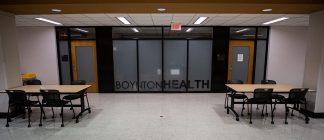By Allison Campbell-Jensen
A new space that has opened up on the fourth floor of Wilson Library is in the Libraries but not of the Libraries. It is a new Boynton Mental Health Clinic for students, which will be important to some students’ success.
The idea for it emerged during a Board of Regents tour of the West Bank a few years ago, during which a Regent asked why there weren’t mental health services on the West Bank. Matthew Hanson, Interim Director of Boynton Health’s Mental Health Clinic, says: “That felt like a real need.” Representatives from the Libraries and Boynton began conversations.
Students have been requesting that mental health services be more available and accessible to them, he says. Even with Student Counseling Services and Boynton Health providing mental health care on the East Bank and on the St. Paul campus, Hanson says, “there are still times when students have to wait to get started or their frequency of their care might be less available.”
He adds: “In helping students, we like to meet them where they are.”
Staffing up to meet mental health needs
In the past decade, Boynton has tripled its mental health staff to meet the increasing needs of students for therapy, counseling, and managing psychiatric medications.
In the past decade, Boynton has tripled its mental health staff to meet the increasing needs of students for therapy, counseling, and managing psychiatric medications. Mental health issues often emerge in the years of young adulthood, when many are in college, but this surge seems different. “There’s been a lot of conversation about what’s driving this increase,” Hanson says. “We are certainly not alone at the University of Minnesota. This is a national, probably an international, phenomenon.”
Some of the influences outside of college may be macro-level stresses arising from such forces as climate change, economic strains, and political pressure, as Mackenzie Callaway, a Ph.D. student in biomedical engineering, suggested to Minnesota Alumni magazine (Summer 2021, “Under Pressure,” p. 24). “There is an increase of students who are homeless or facing food insecurity,” Callaway told the magazine.
Recently, of course, students also have been dealing with COVID-19 and with the murder of George Floyd and its repercussions.
Recognizing the need, U President Joan Gabel has student mental health as one of the five initiatives of her administration. The Libraries administration is eager to support this initiative.
Why put a clinic in Wilson?
“There’s something very public about a library space: It welcomes all students. … It’s kind of a democratic location. Anybody from any program uses the library.”
—Matthew Hanson
Interim Director of Boynton Health’s Mental Health Clinic
When considering where to put the clinic, in addition to the Libraries, Boynton Health talked with the Humphrey School of Public Affairs and the Law School. The planning team, however, thought students who were not enrolled in those schools might feel less comfortable going there for services.
Having it in Wilson Library, however, made sense, Hanson says. “There’s something very public about a library space: It welcomes all students. … It’s kind of a democratic location. Anybody from any program uses the library.”
The clinic opened June 16 for one day a week with two providers offering telehealth to current patients by appointment only. As technology bugs are worked out, services will expand and the clinic is expected to be fully operational by the beginning of fall semester.
Students primarily located on the West Bank will have a place to go for therapy and counseling. And those with severe mental health issues will avoid the formidable challenge of walking across the Washington Avenue Bridge.
“If students have any kind of suicidal ideation, or are even thinking about that, even crossing the bridge can be a bit overwhelming,” Hanson says.
Providing a way around barriers and a safe place for students to explore? Wilson Library seems like an appropriate place for this clinic.




